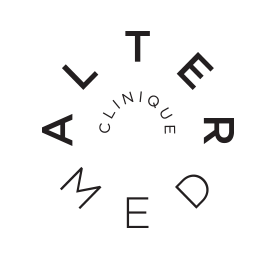Clinique altermed
Montreal nutrition
Eating the right amount of protein, sodium, potassium or phosphorus may help control the buildup of waste and fluid in your blood. This means your kidneys do not have to work as hard to remove the extra waste and fluid. xx
Also, all recommendations must be discussed with your family physician since certain supplements and medications might adjust the recommendations below.
PROTEIN
Your body needs protein to help build muscle, repair tissue, and fight infection. If you have kidney disease, you may need to watch how much protein you eat.
Having too much protein can cause waste to build up in your blood. Your kidneys may not be able to remove all the extra waste. It is important to eat the right amount of protein each day.
xx
The amount of protein you need is based on your body size, your kidney problem, and the amount of protein that may be in your urine. Protein intake should not be too low, or it may cause other problems.
SODIUM
Healthy kidneys control how much sodium is in your body. If your kidneys do not work well, too much sodium can cause fluid buildup, swelling, higher blood pressure, and strain on your heart. xx
You can limit sodium by avoiding table salt and foods such as:
-
Seasonings like soy sauce, sea salt, teriyaki sauce, garlic salt, or onion salt
-
Most canned foods and frozen dinners (unless they say "low sodium"; check the label)
-
Processed meats like ham, bacon, hot dogs, sausage, and deli meats
-
Salted snack foods, like chips and crackers
-
Canned or dehydrated soups (like packaged noodle soup)
-
Most restaurant foods, take-out foods, and fast foods
xx
Tips
xx
-
Learn to read food labels so you know what you are eating. Reading labels can help you shop for foods with lower sodium and to check for "added" nutrients that may be bad for you.
-
Do NOT use salt substitutes unless approved by your doctor.
-
Try fresh or dried herbs and spices instead of table salt to bring out the flavor of foods. When you limit salt, you may have to use more herbs and spices to get more flavor. Also, try adding a dash of hot pepper sauce or a squeeze of lemon juice for flavor.
POTASSIUM
Potassium works with the muscles, including the heart. Too much or too little potassium in the blood can be very dangerous.
xx
The amount of potassium you need is based on how well your kidneys are working and medications you are taking.
xx
Too much or too little potassium in the blood can be dangerous. Some people with kidney disease need more potassium; others need less. How much you need depends on how well your kidneys are working. It also depends on whether or not you are taking any medicine that changes the level of potassium in your blood.
xx
Large amounts of potassium are found in:
xx
-
Certain fruits and vegetables (like bananas, melons, oranges, potatoes, tomatoes, dried fruits, nuts, avocados, deep-colored and leafy green vegetables, and some juices)
-
Milk and yogurt
-
Dried beans and peas
-
Most salt substitutes
-
Protein-rich foods, such as meat, poultry, pork, and fish
PHOSPHORUS
As kidney function gets lower, extra phosphorus can start building up in the blood. High phosphorus levels can cause bones to get weaker.
xx
Phosphorus is a mineral found in many foods. Large amounts of phosphorus are found in:
xx
-
Dairy products such as milk, cheese, yogurt, ice cream, and pudding
-
Nuts and peanut butter
-
Dried beans and peas, such as kidney beans, split peas, and lentils
-
Beverages such as cocoa, beer, and dark cola drinks
-
Bran breads and bran cereals
-
Processed, convenience, and fast foods, including some meats that have additives to make them tender
CALCIUM
Foods that are good sources of calcium are often high in phosphorus. Talk to your family physician before taking any over the counter vitamin D or calcium supplements.
FLUIDS
Most people in the early stages of kidney disease do not need to limit the amount of fluids they drink.
xx
If your kidney disease gets worse, your family physician can let you know if you need to limit fluids and how much to drink each day.
FULL LIST OF FOODS TO AVOID (more might be added if prescribed by your family physician)
-
Salted, smoked or canned meats: smoked beef, bacon, ham, salted bacon, cold meats (salami, bologna, black pudding, greaves, liver pate, etc.)
-
Salted, smoked or canned fish: smoked haddock, anchovies, caviar, salted herring, salted cod, sardines, canned salmon and tuna
-
All cheeses: most
-
Butter milk, malted milk
-
"Instant" lunch Preparations and desserts with commercial milk
-
Ice cream with nuts, soft ice cream
-
Chocolate milk (from the trade)
-
Sweetened condensed milk
-
Frozen dishes, ready to serve
-
Chinese or Italian dishes (from the trade)
-
Meat extracts: in cubes, powders or liquid concentrates (Oxo, Bovril®)
-
Canned vegetables (containing a sodium-based preservative)
-
Tomato and vegetable juice with salt
-
Tomato paste
-
Sauerkraut
-
Vegetables rich in potassium: artichokes, Swiss chard, pumpkins, winter squash, cooked spinach (frozen or fresh), beet leaves, parsnips, sweet potatoes, bamboo stalks
-
Certain fruits: avocado, dried and candied fruits (dried apricots), prune juice, kiwi, nectarine
-
Coconut, almonds and peanuts
-
Olives
-
Plantain
-
Rhubarb
-
Dried beans: dried peas, dried beans, lima beans, beans with bacon, pea soup, lentils, etc.
-
"Instant" potatoes, frozen, cooked with peel, fries, potato chips
-
Sweet or sour marinades, pickled onions, pickled beets, salted
-
Salty crackers (soda), Ritz® cookies
-
Cereals containing nuts or coconut (Alpen, Croque Nature or Granola)
-
Instant cooking cereals
-
Seasoned bread crumbs (eg Shake'n Bake)
-
Commercial mixes for cookies, muffins, pancakes, pies or cakes
-
Salted popcorn
-
Pumpernickel bread
-
Pretzels
-
Bran Buds, Raisin Bran, Shreddies®
-
Commercial salad dressings
-
Bacon fat
-
Salty bacon
-
Fruit jelly (Jell-O type)
-
Maple Products: Maple Water, Syrup, Pull, Maple Sugar
xx


